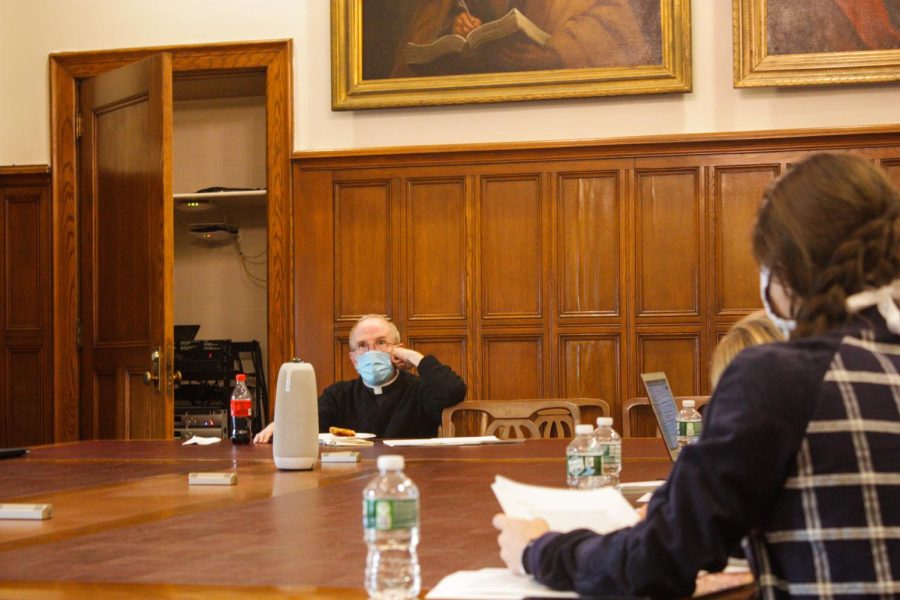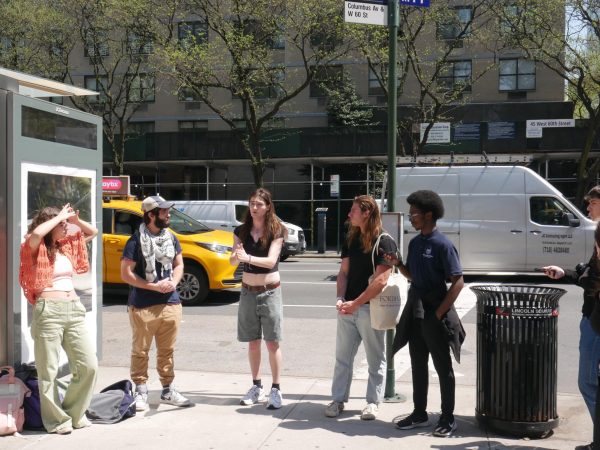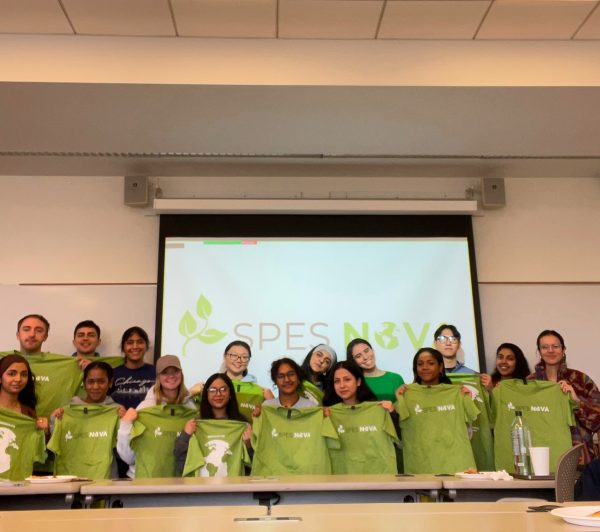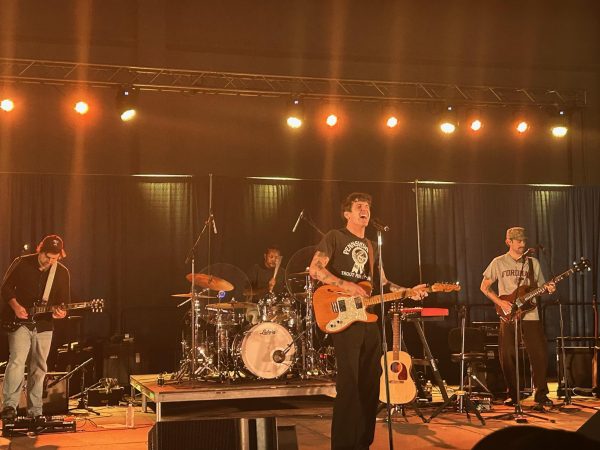McShane Meets With Student Press to Discuss Departure
Rev. Joseph M. McShane, S.J., president of the university, sat down with Fordham’s student newspapers, The Fordham Ram and Observer, on Thursday, Nov. 11, to discuss his upcoming departure from Fordham after 25 years. McShane also addressed questions on Fordham’s approach to climate change, free speech on campus, the dining company Aramark and other student concerns.
McShane stressed that he is not officially part of the search committee, nor is he active in the search for the university’s new president. He said he felt helping choose his successor “would be a major mistake” and that someone leaving office should relinquish their control in this regard.
McShane said he thought, although with uncertainty, that the search would be completed by March in order to announce the results by April’s board of trustees meeting.
Recently, the community has questioned whether the University will continue its tradition of appointing priests as president. All 33 of Fordham’s past presidents have been members of the Society of Jesus, and a woman has never taken on the role.
In response to questions about a layperson succeeding him, McShane pointed at the several Jesuit universities currently led by a layperson, including Georgetown University and Loyola University Chicago, and said he did not have a doubt in his mind that a layperson could successfully do the job.
McShane reflected on his many years at Fordham — six as dean of Fordham College at Rose Hill and 19 as president of the university. He expressed hope that his successor makes plenty of time to meet with students. McShane said he has tried his best during his time as president to have as much face-to-face time with Fordham students as possible. Still, he wishes he could have done more.
“One of the sad realities of my life is that neither my calendar or my life is my own,” said McShane. “The central part of the life of the university is the students and their academic growth. In order to attend to all of that, I have to be involved in a lot of things that could be seen as a distraction in time and effort. Could I be more attentive? Yes. Could I find more time? That’s the biggest challenge is finding time.”
He suggested that during the first couple years as president, a wise successor should say little and make it their primary job to listen.
“Especially early in their tenure, the president needs the university community more than the community needs her or him,” McShane said. “It is in the community that the spirit and culture are nurtured.”
Another piece of advice for his successor? “Don’t answer so many emails,” said McShane.
He said has been consumed by answering emails arriving at his inbox around 6:00 a.m. each morning and staying late into the night, often with HGTV playing in the background — his favorite television network. McShane emphasized that face-to-face meetings and phone calls have proved more fruitful and valuable than email communications for him during his time as president.
McShane also said he hopes his successor will continue some of the practices he’s adopted to facilitate a better sense of community at Fordham — namely his practice of greeting incoming students and parents on move-in days and at the annual President’s Ball.
“I kind of insist on shaking hands with everyone that comes through the line. It is one of those rare occasions when literally thousands of students are together,” said McShane. “I always want to know more about the students.”
McShane also reflected on some of his regrets and more somber moments from his time as president. He said the saddest moment of his administrative life was a 2017 vote of no confidence from the faculty who unanimously decided that the salary and benefits offer made by the administration was unacceptable. Despite his emotions, McShane said the vote in no way diminished the admiration and affection he had for them.
Student reporters also asked McShane to comment on the controversies surrounding two fixtures of Fordham student life: the food service company Aramark and the health insurance provider Aetna.
Aramark, which runs Fordham’s on-campus dining locations, has been publicly criticized for the reported poor quality of the food it serves in American prisons. The company has drawn criticism for its alleged use of unpaid labor in some of the prisons it operates in as well as serving substandard food to prisoners.
Fordham signed a 10-year contract valued at tens of millions of dollars with Aramark in 2016. University Dining Contract Liaison Deming Yaun has previously told the Ram that Aramark and Fordham have a mutually beneficial relationship.
McShane said that he was aware of the controversy over Aramark’s presence in prisons but was unaware of the company’s alleged use of unpaid labor in prisons. He said he recommends students engage in “conversations with those parts of the university that deal with those issues and companies.”
Cutting ties with the food service company was included in the list of demands that Fordham’s Black Student Alliance (ASILI) made to the university in the summer of 2020, following the death of George Floyd and subsequent Black Lives Matter protests.
Reporters also asked McShane to address the controversy surrounding the health insurance provider Aetna, which was sued in September for “allegedly discriminating against beneficiaries that are lesbian, gay, bisexual, transgender and queer by requiring them to pay more out of pocket for fertility treatments,” according to NBC. Fordham began requiring all students taking six or more credits each semester to purchase a health insurance plan from Aetna in 2019, unless they are “adequately” covered by external insurance policies.
McShane said he was not aware of the controversy connected to Aetna. “That’s a new revelation to me honestly. I’ll have to do some more research on that,” he told student reporters. McShane also was unaware of the specifics of Fordham’s health insurance requirements for students.
In response to inquiries about a potential disconnect between a more progressive student body and conservative administration, McShane said that he perceived a “difference.” However, he suggested this contrast of perspectives and values can be educational.
“I see that there is a difference, disconnect is too hard a word; it indicates that there is no contact, no conversation, no attempt to understand one another,” McShane said. “There is a difference in age, there is a different outlook, difference in formation that is there. In conversation, each can learn from the other.”
McShane also addressed the growing concern regarding severe weather brought on by global climate change and how this could affect Fordham’s infrastructure in the future. In early September, several university buildings on the Rose Hill campus — most notably the Walsh Library — sustained damage from flash flooding. The lowest level of the library is still closed to students over two months later.
McShane said he doesn’t feel that Walsh Library is in an optimal location, given its position at the convergence of three downhill slopes.
“If I could wave my hand and everything changed, I would change the location of the Walsh Library,” said McShane. “I would have built it on flat space.”
McShane explained that the floodwaters that damaged the library came at the building with such force that they broke through windows. He also cited less severe damage to some residence halls and the newly-constructed campus center.
Going forward, McShane speculated that future building projects might have to allocate more of their total budgets to ensure new infrastructure is better prepared to handle flash flooding and other climate-related concerns.
McShane cited the university’s previous initiatives to combat climate change and become more sustainable. These include installing solar panel farms on the Rose Hill campus parking garage and Staten Island, planting hundreds of trees at Rose Hill and signing America’s Pledge, a project by Bloomberg Philanthropies meant to help the United States meet the Paris Agreement’s climate goals.
McShane said the next major construction project that Fordham will undertake will likely be at the Lincoln Center campus, where the university hopes to continue to expand facilities.
McShane’s final years at Fordham were marked by the stress of the COVID-19 pandemic. However, he expressed joy at students “reclaiming life” this semester, the first with full in-person course offerings since the spring semester of 2020. “One of the great delights at the beginning of this semester was the return of noise under my window,” he said. “I went for all those months without boisterous students under my window. It’s the music of the university.”
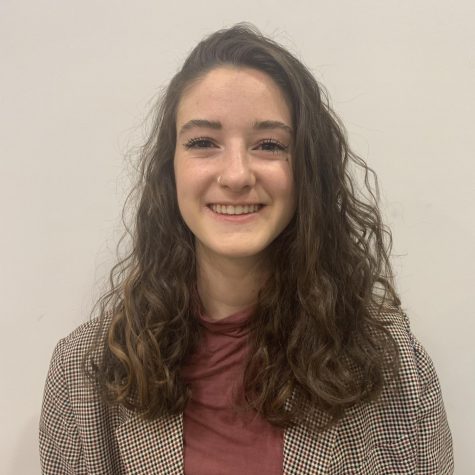
Editor in Chief for Volume 103
Culture Editor for Volume 101, Volume 102.
Rachel Gow is a junior at Fordham College at Rose Hill, majoring in Journalism...
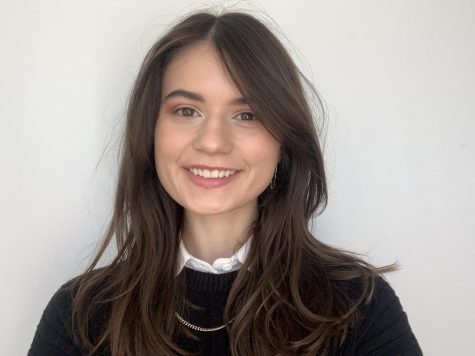
Abbey Delk is a junior from Wheeling, West Virginia, double majoring in English and journalism and minoring in film & television. Her career at the...



































































































































































































